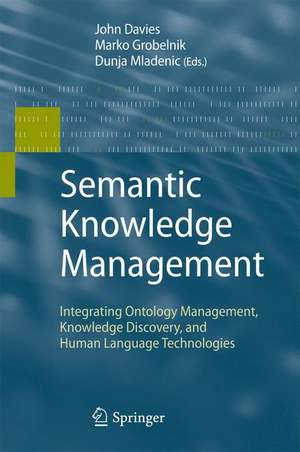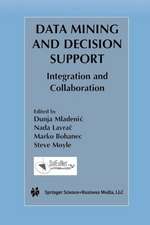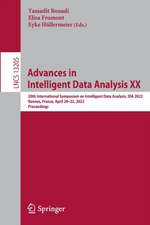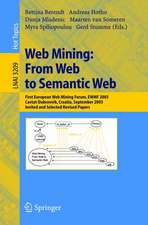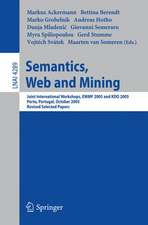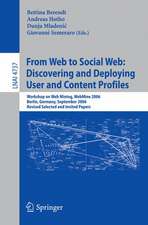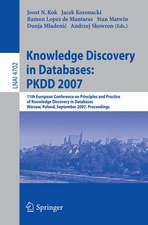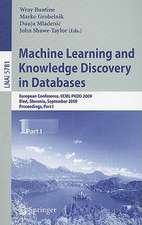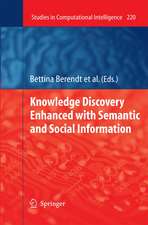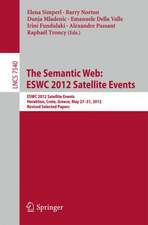Semantic Knowledge Management: Integrating Ontology Management, Knowledge Discovery, and Human Language Technologies
Editat de John Francis Davies, Marko Grobelnik, Dunja Mladenicen Limba Engleză Hardback – 23 ian 2009
Davies, Grobelnik and Mladenic have grouped contributions from renowned researchers into four parts: technology; integration aspects of knowledge management; knowledge discovery and human language technologies; and case studies. Together, they offer a concise vision of semantic knowledge management, ranging from knowledge acquisition to ontology management to knowledge integration, and their applications in domains such as telecommunications, social networks and legal information processing.
This book is an excellent combination of fundamental research, tools and applications in Semantic Web technologies. It serves the fundamental interests of researchers and developers in this field in both academia and industry who need to track Web technology developments and to understand their business implications.
| Toate formatele și edițiile | Preț | Express |
|---|---|---|
| Paperback (1) | 330.75 lei 6-8 săpt. | |
| Springer Berlin, Heidelberg – 10 noi 2010 | 330.75 lei 6-8 săpt. | |
| Hardback (1) | 337.85 lei 6-8 săpt. | |
| Springer Berlin, Heidelberg – 23 ian 2009 | 337.85 lei 6-8 săpt. |
Preț: 337.85 lei
Preț vechi: 422.31 lei
-20% Nou
Puncte Express: 507
Preț estimativ în valută:
64.65€ • 67.68$ • 53.49£
64.65€ • 67.68$ • 53.49£
Carte tipărită la comandă
Livrare economică 05-19 aprilie
Preluare comenzi: 021 569.72.76
Specificații
ISBN-13: 9783540888444
ISBN-10: 3540888446
Pagini: 264
Ilustrații: X, 252 p.
Dimensiuni: 155 x 235 x 20 mm
Greutate: 0.57 kg
Ediția:2009
Editura: Springer Berlin, Heidelberg
Colecția Springer
Locul publicării:Berlin, Heidelberg, Germany
ISBN-10: 3540888446
Pagini: 264
Ilustrații: X, 252 p.
Dimensiuni: 155 x 235 x 20 mm
Greutate: 0.57 kg
Ediția:2009
Editura: Springer Berlin, Heidelberg
Colecția Springer
Locul publicării:Berlin, Heidelberg, Germany
Public țintă
ResearchCuprins
to Semantic Knowledge Management.- Ontology Management.- Knowledge Discovery for Semantic Web.- Human Language Technologies.- OntoSTUDIO® as a Ontology Engineering Environment.- Shared Ontology for Knowledge Management.- Semantically Enhanced Search and Browse.- Semantic Web for Knowledge Sharing.- Natural Language Generation from Ontologies.- Ontology Generation from Social Networks.- Capturing Document Semantics for Ontology Generation and Document Summarization.- Visualization of Temporal Semantic Spaces.- Semantic MediaWiki.- Deploying and Evaluating Semantic Technologies in a Digital Library.- Semantic Technology for Professional Judicial Knowledge.- Semantic Web for Knowledge Reuse in Business Processes.- User Quality and Business Benefit of Semantic Knowledge Management Applications.- Challenges of Semantic Knowledge Management.
Recenzii
From the reviews:
"This book consists of a collection of papers on different aspects of semantic Web technology: ontology management, knowledge discovery, and human language technologies. … This book is a good resource for those who wish to learn about the different problems that semantic knowledge management techniques address, including how to apply the techniques. … the interested reader may use the lists of references provided in each chapter to learn more." (J. Hodges, ACM Computing Reviews, July, 2009)
“Semantic Knowledge Management edited by John Davies, Marko Grobelnik and Dunja Mladenic, provides an overview of the results of the Semantic Knowledge Technologies (SEKT) project … . this book presents the design, implementation, and evaluation of several semantically-enhanced information retrieval applications. … I would … recommend this book to anyone who wants to get a good grasp on how semantic technologies can be applied to enhance traditional information retrieval systems.” (David Vallet, Information Retrieval, February, 2010)
"This book consists of a collection of papers on different aspects of semantic Web technology: ontology management, knowledge discovery, and human language technologies. … This book is a good resource for those who wish to learn about the different problems that semantic knowledge management techniques address, including how to apply the techniques. … the interested reader may use the lists of references provided in each chapter to learn more." (J. Hodges, ACM Computing Reviews, July, 2009)
“Semantic Knowledge Management edited by John Davies, Marko Grobelnik and Dunja Mladenic, provides an overview of the results of the Semantic Knowledge Technologies (SEKT) project … . this book presents the design, implementation, and evaluation of several semantically-enhanced information retrieval applications. … I would … recommend this book to anyone who wants to get a good grasp on how semantic technologies can be applied to enhance traditional information retrieval systems.” (David Vallet, Information Retrieval, February, 2010)
Notă biografică
Dr John Davies leads the Next Generation Web research division at BT. Current interests centre around the application of semantic web and Web 2.0 technology to knowledge management, business intelligence, information integration and service-oriented environments. He is chairman of the European Semantic Technology Conference series (www.estc2007.org) and co-organiser of the ESWC conference series and has written and edited many papers and books in the area of semantic technology and its business applications, web-based information management and knowledge management. He also received the BT Technology Award for Technology Entrepreneurship for his contribution to the creation of Infonic.
Dr. Dunja Mladenic works as a researcher at the Department of Knowledge Technologies of the J. Stefan Institute, Ljubljana, Slovenia since 1992 and is an expert in Machine Learning, Data Mining and Text Mining techniques and their application to real-world problems in different areas such as publishing, medicine, pharmacology, manufacturing, economy. Her current research focuses on data analysis, with particular interest in learning from Text and the Web including personal intelligent agents. She has edited many books and papers in refereed conferences and journals.
Marko Grobelnik is an expert in analysis of large amounts of complex data with the purpose to extract useful knowledge. In particular, his areas of expertise comprise: Data Mining, Text Mining, Information Extraction, Link Analysis, and Data Visualization as well as more integrative areas such as Semantic Web, Knowledge Management and Artificial Intelligence. Apart from research on theoretical aspects of unconventional data analysis techniques, he has valuable experience in the field of practical applications and development of business solutions based on the innovative technologies. He has published many papers in refereed conferences and journals.
Dr. Dunja Mladenic works as a researcher at the Department of Knowledge Technologies of the J. Stefan Institute, Ljubljana, Slovenia since 1992 and is an expert in Machine Learning, Data Mining and Text Mining techniques and their application to real-world problems in different areas such as publishing, medicine, pharmacology, manufacturing, economy. Her current research focuses on data analysis, with particular interest in learning from Text and the Web including personal intelligent agents. She has edited many books and papers in refereed conferences and journals.
Marko Grobelnik is an expert in analysis of large amounts of complex data with the purpose to extract useful knowledge. In particular, his areas of expertise comprise: Data Mining, Text Mining, Information Extraction, Link Analysis, and Data Visualization as well as more integrative areas such as Semantic Web, Knowledge Management and Artificial Intelligence. Apart from research on theoretical aspects of unconventional data analysis techniques, he has valuable experience in the field of practical applications and development of business solutions based on the innovative technologies. He has published many papers in refereed conferences and journals.
Textul de pe ultima copertă
Despite its explosive growth over the last decade, the Web remains essentially a tool to allow humans to access information. Semantic Web technologies like RDF, OWL and other W3C standards aim to extend the Web’s capability through increased availability of machine-processable information.
Davies, Grobelnik and Mladenic have grouped contributions from renowned researchers into four parts: technology; integration aspects of knowledge management; knowledge discovery and human language technologies; and case studies. Together, they offer a concise vision of semantic knowledge management, ranging from knowledge acquisition to ontology management to knowledge integration, and their applications in domains such as telecommunications, social networks and legal information processing.
This book is an excellent combination of fundamental research, tools and applications in Semantic Web technologies. It serves the fundamental interests of researchers and developers in this field in both academia and industry who need to track Web technology developments and to understand their business implications.
Davies, Grobelnik and Mladenic have grouped contributions from renowned researchers into four parts: technology; integration aspects of knowledge management; knowledge discovery and human language technologies; and case studies. Together, they offer a concise vision of semantic knowledge management, ranging from knowledge acquisition to ontology management to knowledge integration, and their applications in domains such as telecommunications, social networks and legal information processing.
This book is an excellent combination of fundamental research, tools and applications in Semantic Web technologies. It serves the fundamental interests of researchers and developers in this field in both academia and industry who need to track Web technology developments and to understand their business implications.
Caracteristici
Includes supplementary material: sn.pub/extras
